Soft skills e curriculum universitario: un caso applicato per i laureati di ingegneria
Titolo Rivista EDUCATIONAL REFLECTIVE PRACTICES
Autori/Curatori Valeria Caggiano
Anno di pubblicazione 2019 Fascicolo 2018/2
Lingua Italiano Numero pagine 14 P. 94-107 Dimensione file 170 KB
DOI 10.3280/ERP2018-002007
Il DOI è il codice a barre della proprietà intellettuale: per saperne di più
clicca qui
Qui sotto puoi vedere in anteprima la prima pagina di questo articolo.
Se questo articolo ti interessa, lo puoi acquistare (e scaricare in formato pdf) seguendo le facili indicazioni per acquistare il download credit. Acquista Download Credits per scaricare questo Articolo in formato PDF

FrancoAngeli è membro della Publishers International Linking Association, Inc (PILA), associazione indipendente e non profit per facilitare (attraverso i servizi tecnologici implementati da CrossRef.org) l’accesso degli studiosi ai contenuti digitali nelle pubblicazioni professionali e scientifiche.
The complexity of the work has forced universities to think of curricular activities and curricula that can make graduates profitable (Andrews, Highson, 2008) also by designing orientation paths to increase professional spendability (Atkins, 1999). In this scenario, the role of cross-competency valorization is crucial for successful business (McKinsey, 2014; WEF, 2016). The contribution is focused on the cross-sectorial competence analysis of engineers’ work (Berdrow, Evers, 2010), involving 314 graduates who participated in the research. The research involved a university orientation center aimed at encouraging the graduates to enter the job, favoring the critical reflection of the participants in relation to their professional spendiness in relation to the profile of cross-competences.
Valeria Caggiano, Soft skills e curriculum universitario: un caso applicato per i laureati di ingegneria in "EDUCATIONAL REFLECTIVE PRACTICES" 2/2018, pp 94-107, DOI: 10.3280/ERP2018-002007